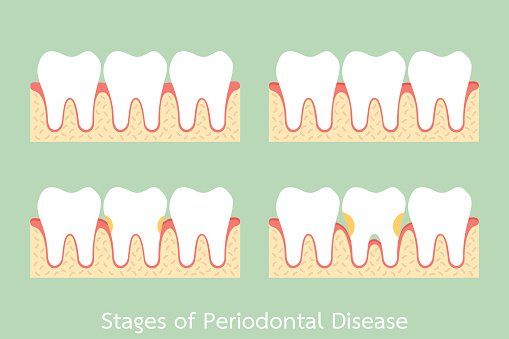PERIODONTAL DISEASE

Periodontal Disease
Periodontal disease
begins with inflamed, bleeding
and swollen gums
called gingivitis. Gingivitis is a completely reversible disease
process but if left untreated
can progress to periodontal disease. Periodontal disease has varying stages of severity including mild, moderate and severe. It can also be localized affecting only one or two teeth or can be generalized and affect a person’s entire mouth. Mild (or early) periodontal disease often causes no symptoms at all. As the disease progresses, however symptoms can include bad breath, mouth sores, loosening of teeth, and possibly infections. Periodontal disease is diagnosed and its severity categorized based on X-ray interpretation and measurement of gum pockets. Normal healthy gum pockets should be in the 1-3mm range.

Patients with periodontal disease have a deepening of these gum pockets indicating a loss of bone supporting the teeth; the stage of periodontal disease a patient has is determined by how deep those pockets are and how much bone loss has occurred. Periodontal disease has a myriad of causes including genetics, poor oral hygiene, smoking, poorly controlled diabetes, clenching/grinding teeth, and sometimes the cause is unknown. As gum pockets deepen buildup of plaque and hardened plaque called tartar occurs. When this tartar accumulation occurs in these deepened gum pockets the periodontal disease process continues and worsens. Proper oral hygiene (including twice daily brushing and flossing) removes the plaque and bacteria that grow in these pockets. Only by having your teeth professionally cleaned can the tarter be removed from your teeth. When this tarter buildup is below the gum line, a procedure called scaling and root planing (also known as a deep cleaning) is done to remove it. Periodontal disease is the leading cause of tooth loss among American adults – even more so than cavities.
How do I know if I have periodontal disease?
If you are suffering with any of the symptoms listed above, schedule a dental exam immediately at Binninger Family Dentistry to find out if you need periodontal treatment. If you are symptom-free, you still need to visit Dr. Binninger twice yearly for an exam.
How do I treat it if I do have periodontal disease?
Treatments vary according to the type of periodontal disease you have and how far it has progressed, although Dr. Binninger’s goal is to provide the most effective and conservative treatment possible.
How can I prevent periodontal disease from returning in the future?
Unfortunately periodontal disease has no cure. It can only be managed. The goal of treatment is to create a stable environment where the disease is not progressing and no further deepening of gum pockets or loss of supporting bone occurs. You can help prevent progression of the disease by brushing and flossing twice daily, avoiding tobacco products, adopting a healthy and nutritious diet, and attending frequent dental exams and cleanings as recommended by Dr. Binninger.
Periodontal Scaling & Root Planing
Periodontal scaling and root planing (also called a deep cleaning) is a procedure used to treat periodontal disease. This procedure involves numbing the area to be worked on and gently removing the hardened plaque near or below the gum line. This is where harmful bacteria can grow and cause damage to both the hard and soft tissues of the mouth. An antibiotic called Arestin may be administered into the gum pockets to ensure that no bacteria remain at the treatment site.

Frequently Asked Questions
Do I need a periodontal scaling and root planing?
You may need scaling and root planing if you are suffering from mild to moderate periodontal disease. Visit Dr. Binninger for an exam if you are experiencing any of the symptoms of periodontal disease, such as inflamed or receding gums, chronic bad breath, or loose teeth.
What should I expect during scaling and root planing procedure?
If you require a scaling and root planing, you may first be made comfortable by being given local anesthetic. You should feel no discomfort during the procedure, only the sensation of the cleaning instruments used to remove the hardened plaque. Procedure lengths vary according to the extent of the disease and the areas it is located within the mouth. If your periodontal disease is widespread, you may need to spread out your treatment into multiple visits.
Will I need to follow any special post-treatment care instructions?
Yes. You’ll be advised to avoid certain habits that can cause a delay in your healing response, such as smoking. Most patients experience little or no discomfort after scaling and root planning, although your mouth may continue to be numb for several hours following the procedure.
What should I expect from Arestin?
Arestin is highly effective for destroying the bacteria that causes gum disease. However, it is possible that you will require additional treatments.
Are there any steps I need to take after being treated with Arestin?
In the initial week to 10 days following Arestin treatment, you will need to avoid consuming hard, crunchy, and sticky foods such as candy and gum. You should also temporarily eliminate flossing from your dental routine. At the end of the treatment period, you may resume flossing and are encouraged to stop smoking (if applicable), and maintain a healthy blood sugar level if you are diabetic.
Did you know?
“Bad gums could be as strong a risk factor for heart attacks as smoking cigarettes, which is blamed for about 40,000 heart-related deaths a year.” – (Daniel Haney, AP Medical Director, February 17, 1998)
“A study of fatty deposits lodged in the carotid arteries of stroke sufferers show that 70% contain bacteria and 40% of that bacterium comes from the mouth.” (USA Today, April 14, 1998)
“Men with periodontal disease have a stronger propensity for cardio-vascular disease than men without periodontal disease, with those under 50 with periodontal disease having a greater risk than those over 50.” (J. Periodontal 1998:69:841-850)
“Diabetics with gum disease were more likely to have heart attacks than those without gum disease.” (USA Today, April 14, 1998)
“Women with gum disease are more likely to give birth prematurely to low-weight babies.” (USA Today, April 14, 1998)
“Bacteria in plaque are linked to lung infections in people with chronic lung diseases such as chronic obstructive pulmonary disease.” (USA Today, February 17, 1998)
“It appears that the extent of sites with probing depths>3mm is strongly related to the incidence of total coronary heart disease.” (Annuals of Periodontology, Vol.3, #1, July 1998:127-141)
“Studies also suggest that good oral hygiene habits may improve fertility in sub fertile males.” (Internet, dentist: Oral Health and Hygiene, September, 1999)





